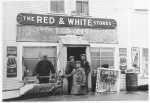Page
1 | Page 2 | Page 3
Jake
M. Unrau served in a number of different places. He began in a forestry
camp in Ontario and moved from there to a dairy farm in Manitoba.
“When
the war started to wind down in 1944-45 and there was a chance
to change working places, I started to work at Universal Machine
Shop on Mary's Road, in St. Vital, Manitoba. While employed there,
I learned some new trades: welding and foundry work involving
molding patterns in the sand, which I enjoyed. My employer bought
scrap aluminum from dealers in the city. Most of the scrap consisted
of condemned airplane motors that had to be broken into smaller
pieces so we could get them into a crucible pot, which was heated
by a coke coal forced air burner until the aluminum became liquid.
Then the molten metal was poured into these sand molds, which
yielded the desired product. We made aluminum used-oil reclaimers
[and] installed [them] on tractors, trucks and cars. We also made
aluminum parts for cast iron Booker Stove Space Heaters used in
homes and ships. I enjoyed making useful things out of discarded
wartime airplane motors."
Like
all other COs, Jake gave money to the Red Cross.
“From
spring 1943 to fall 1945, I paid money to the Canadian Red Cross,
which functioned to save lives, also during the time of the war.
My donations consisted of a regular pay cheque deduction contribution
of $15 per month for about 16 months, and the rest of the time
it was from $3 to $7 a month. These were not easy times in my
life but very worthwhile. I am thankful to God and to our Canadian
government that allowed me to live according to my conscience
as an objector to direct combat.” [ASP, 198-199]
 |
| A Rosenort, Manitoba, store flooded in 1950. |
Page
1 | Page 2 | Page 3
|


